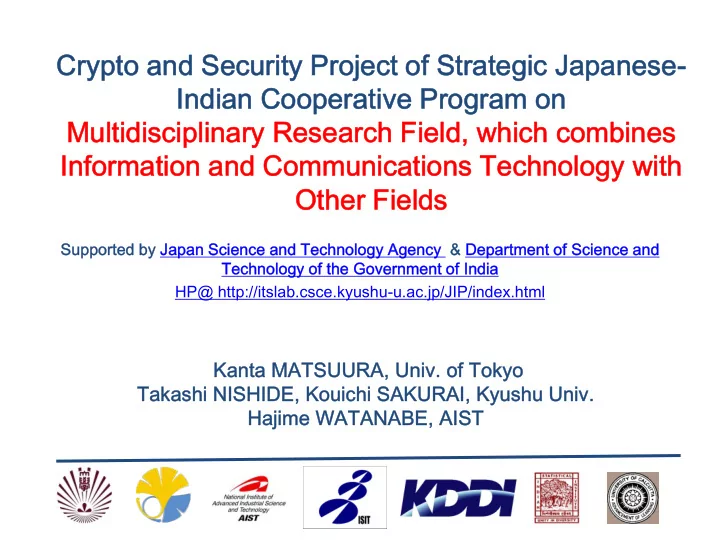

Crypto and Security Project of Strategic Japanese- Indian Cooperative Program on Multidisciplinary Research Field, which combines Information and Communications Technology with Other Fields Supported by Japan Science and Technology Agency & Department of Science and Technology of the Government of India HP@ http://itslab.csce.kyushu-u.ac.jp/JIP/index.html Kanta MATSUURA, Univ. of Tokyo Takashi NISHIDE, Kouichi SAKURAI, Kyushu Univ. Hajime WATANABE, AIST
R Team # Name Affiliation E 1 Prof. Kouichi SAKURAI Kyushu University S E 2 Prof. Kanta MATSUURA Tokyo University A 3 Dr. Hajime WATANABE AIST* R C *: National Institute of Advanced Industrial Science and Technology H Team # Name Affiliation 1 Prof. Bimal ROY Indian Statistical Institute T 2 Prof. Anish MATHURIA DA ‐ IICT* E A 3 Dr. Sugata GANGOPADHYAY India Institute of Technology M S *: Dhirubhai Ambani Institute of Infomation and Communication Technology
Analysis of Cryptographic Algorithms and Evaluation on 1 Enhancing Network Security Based on Mathematical Science developing prototypes The main objects: 1. To design cryptographic algorithms, and implementation Implement with prototype; 2. To gather information on cryptographic algorithms network incident data and model them; and Analyze and proof 3. To analyze and prove the security of cryptographic algorithmic/mathematical algorithms with theory algorithmic/mathematical theory. 1,2: Japan Side; 3: India Side
Security proofs and multidisciplinary evaluation 2 for dynamic hierarchical key assignment schemes � A comprehensive project � The main objectives: Key assignment � (1) to develop and apply a proof model for reasoning about the security of dynamic schemes; and � (2) to evaluate the proposed model in a multidisciplinary way. (System security) Evaluation � The sub topics include (3) provable security in general. Rigorous � (1) and (3) are different in security proofs (Crypto/Formal) terms of technology but can be evaluated in a Evaluation similar manner in terms of economic impacts and implications. (Economics) (1) Anish Mathuria (Dhirubhai Ambani Institute of ICT) (2),(3) Kanta Matsuura (The University of Tokyo) International collaboration
Design & Security Evaluation of RFID & Cryptographic Techniques 3 for Sensor Networks and Its Components 3H: High Efficiency; High Develop highly secure Performance; High Safety • functionalities in RFID and sensor network where only limited computation abilities are available Limited computation ability Develop and implement • highly efficient functionalities with simple RFID/ Sensor Network hardware and low electronic power consumption
Joint Workshop Announcement • 1 st workshop held on12th December, 2009, India - Total 11 reports from: Prof. Kazukuni Kobara, Dr.Avishek Adhikari,Dr. Rishiraj Bhattacharyya, Dr. Naveen Chaudhary, Dr. Yang Cui, Dr. Takashi Nishide, Dr. Junichi Takeuch, Dr. Jacob Schuldt, Dr. Subhamoy Maitr, Dr. Sugata Gangopadhyay, Dr. Miodrag Mihaljevic. - Main topics: Multi ‐ Secret Sharing Scheme, Hash Function, Code ‐ Based Public ‐ Key Cryptosystems, Undeniable Signature, etc. - 2 nd workshop held in 2010 ,Japan Call for Call for Participation Participation
1 st Workshop Program in India 9.30 ‐ 10.00 Inauguration • 10.00 ‐ 10.30 Tea • 10.30 ‐ 11.00 Constructions of some Multi ‐ Secret Sharing Schemes by Avishek Adhikari • 11.30 ‐ 12.00 Hash Function Combiners by Rishiraj Bhattacharyya • 12.00 ‐ 12.30 Topic To be Decided by Naveen Chaudhary • 12.00 ‐ 12.30 Tea • 12.30 ‐ 13.00 Some Hot Topics on Code ‐ Based Public ‐ Key Cryptosystems by Prof. Kazukuni Kobara • 13.00 ‐ 13.30 Efficient Constructions of Deterministic Encryption from Hybrid Encryption and Code ‐ Based • PKE by Yang Cui 13.30 ‐ 14.30 LUNCH • 14.30 ‐ 15.00 Multiparty Computation for Interval, Equality, and Comparison Without Bit ‐ Decomposition • Protocol by Takashi Nishide 15.00 ‐ 15.30 On Botnet Detection using Sparse Structure Learning by Junichi Takeuchi • 15.30 ‐ 16.00 Undeniable Signatures with Delegatable Verification by Jacob Schuldt • 16.00 ‐ 16.30 Tea • 16.30 ‐ 17.00 Topic To Be Decided by Subhamoy Maitra • 17.00 ‐ 17.30 Third ‐ order nonlinearities of a subclass of Kasami functions by Sugata Gangopadhyay • 17.30 ‐ 18.00 Secret Key Recovery of Keystream Generator LILI ‐ 128 Based on a Novel Weakness of the • Employed Boolean Function by Miodrag Mihaljevic
Thank you for your attention
Recommend
More recommend